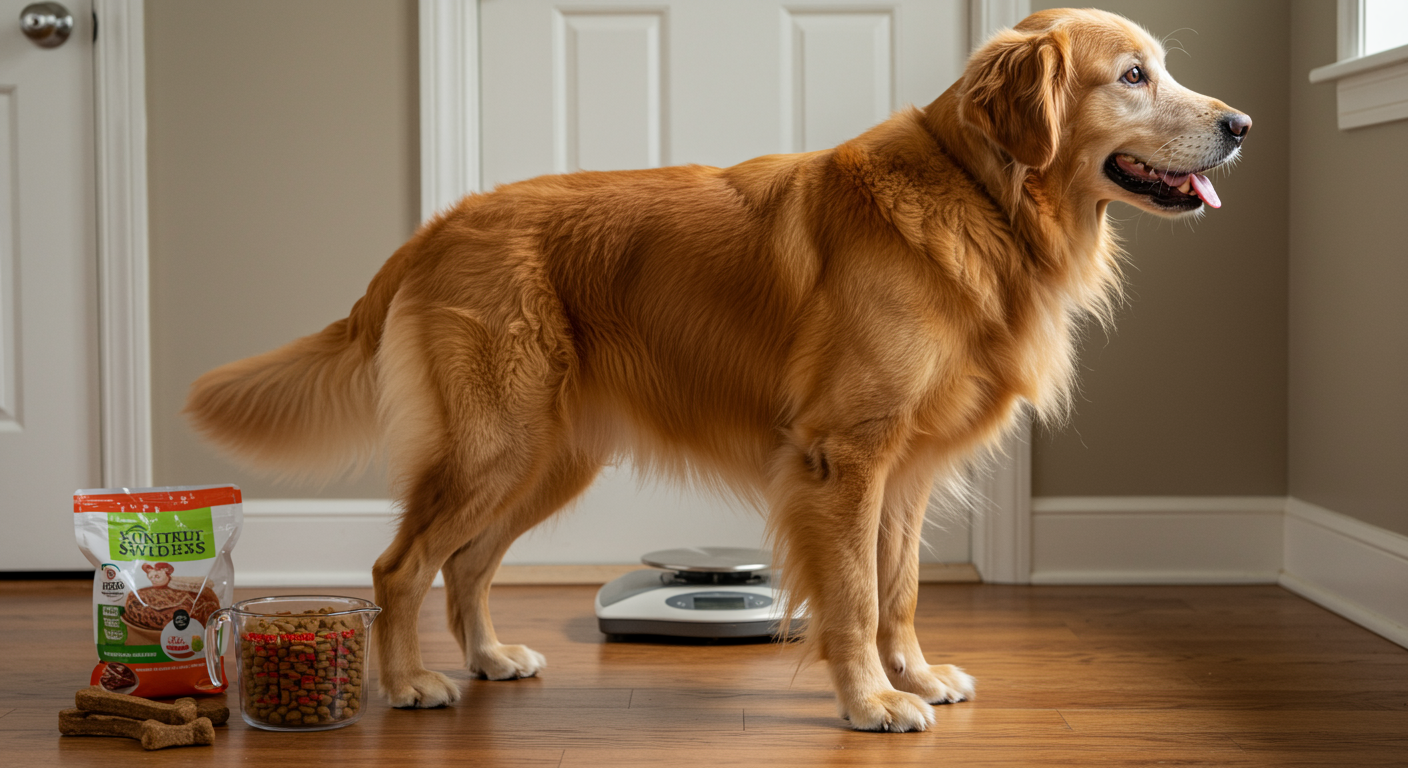Maintaining optimal body weight becomes increasingly challenging yet critically important as Golden Retrievers enter their senior years. Weight management in aging dogs requires a delicate balance between providing adequate nutrition for health maintenance while preventing obesity-related complications that can significantly impact quality of life and longevity.
Senior Golden Retrievers face unique metabolic changes, reduced activity levels, and age-related health conditions that directly influence weight management strategies. Understanding these factors and implementing appropriate interventions can help ensure your beloved companion maintains an ideal weight that supports mobility, joint health, and overall well-being throughout their golden years.
Effective weight management for senior Golden Retrievers extends beyond simple calorie restriction, encompassing comprehensive lifestyle modifications, nutritional optimization, and careful monitoring of health parameters that influence metabolism and weight regulation.
Understanding Weight Changes in Senior Golden Retrievers
Metabolic Shifts in Aging Dogs
Decreased Basal Metabolic Rate
As Golden Retrievers age, their basal metabolic rate naturally decreases due to loss of lean muscle mass and reduced cellular activity. This metabolic slowdown means senior dogs require fewer calories to maintain basic bodily functions, making weight gain more likely if dietary intake remains unchanged.
The decrease in metabolic rate typically begins around 7-8 years of age and continues progressively throughout the senior years. This change can be gradual and subtle, making it easy for owners to miss the need for dietary adjustments until weight gain becomes noticeable.
Understanding this natural metabolic shift allows for proactive dietary modifications that prevent weight gain rather than requiring more aggressive weight loss interventions later. Early recognition and adjustment can maintain ideal body condition throughout the senior years.
Hormonal Changes Affecting Weight
Senior Golden Retrievers experience various hormonal changes that can influence weight regulation. Decreased thyroid function, common in aging dogs, can slow metabolism and promote weight gain even with appropriate caloric intake.
Changes in insulin sensitivity and glucose metabolism can also affect weight management, particularly in dogs developing diabetes or pre-diabetic conditions. These hormonal shifts require careful monitoring and may necessitate specialized dietary approaches.
Growth hormone and other metabolic hormones also decline with age, affecting muscle mass maintenance and fat distribution patterns. These changes contribute to the increased challenge of maintaining ideal weight in senior dogs.
Impact of Reduced Activity Levels
Mobility Limitations and Exercise Capacity
Arthritis, joint stiffness, and other age-related mobility issues commonly reduce exercise capacity in senior Golden Retrievers. This decreased activity level means fewer calories burned through physical activity, contributing to positive energy balance and weight gain.
The pain and discomfort associated with joint problems can create a cycle where reduced activity leads to weight gain, which then places additional stress on joints, further limiting mobility and exercise tolerance.
Early intervention with appropriate pain management and modified exercise programs can help maintain activity levels and prevent this destructive cycle from developing or progressing.
Behavioral Changes and Activity Preferences
Senior Golden Retrievers may show decreased interest in high-energy activities they previously enjoyed, preferring shorter, less intensive exercise sessions. This natural behavioral change requires adjustments in both exercise routines and caloric intake to maintain energy balance.
Mental stimulation becomes increasingly important as physical activity decreases, as boredom and reduced engagement can lead to increased food-seeking behaviors and overeating in some senior dogs.
Adapting activities to match changing preferences and capabilities helps maintain engagement while supporting appropriate energy expenditure for weight management.
Establishing Ideal Weight Parameters
Body Condition Scoring Systems
Visual Assessment Techniques
Body condition scoring provides a standardized method for evaluating weight status in senior Golden Retrievers. The ideal body condition shows a visible waist when viewed from above, easily palpable ribs with minimal fat covering, and an abdominal tuck when viewed from the side.
Regular body condition assessments allow for early detection of weight changes and prompt intervention before significant weight gain or loss occurs. This is particularly important for senior dogs whose weight can change more rapidly due to metabolic and health changes.
Learning proper body condition scoring techniques enables owners to monitor their dog’s weight status between veterinary visits and make appropriate dietary adjustments as needed.
Hands-On Evaluation Methods
Physical examination techniques complement visual assessment in determining ideal weight status. The ribs should be easily palpable with light pressure, and there should be minimal fat covering over the rib cage and spine.
The abdomen should show an upward tuck when viewed from the side, and there should be a visible waist when the dog is viewed from above. Excess fat deposits around the neck, shoulders, and base of the tail indicate overweight condition.
Regular hands-on evaluation helps detect subtle weight changes that may not be immediately apparent through visual assessment alone, particularly important for long-haired breeds like Golden Retrievers.
Breed-Specific Weight Considerations
Golden Retriever Size Variations
Golden Retrievers show considerable size variation within the breed, with males typically weighing 65-75 pounds and females 55-65 pounds when in ideal body condition. However, individual dogs may fall outside these ranges while still maintaining appropriate body condition.
Focus should be placed on body condition rather than absolute weight numbers, as bone structure, muscle mass, and overall build can significantly influence appropriate weight ranges for individual dogs.
Senior Golden Retrievers may experience muscle mass loss that affects overall weight while body fat percentage increases, making body condition assessment more accurate than weight alone for evaluating ideal body composition.
Nutritional Strategies for Weight Management
Senior-Specific Dietary Requirements
Protein Needs and Quality
Senior Golden Retrievers require high-quality protein to maintain muscle mass while managing weight. Adequate protein intake becomes increasingly important with age to prevent muscle wasting that can contribute to metabolic slowdown and weight management difficulties.
The protein should be highly digestible and come from high-quality sources such as chicken, fish, or eggs. Some senior dogs may benefit from increased protein levels compared to adult maintenance diets to support muscle mass preservation.
Balancing protein needs with overall caloric restrictions requires careful diet selection or consultation with veterinary nutritionists to ensure all nutritional needs are met while supporting weight management goals.
Carbohydrate and Fat Balance
Senior weight management diets typically feature reduced fat content to decrease overall caloric density while maintaining palatability and essential fatty acid intake. Complex carbohydrates provide sustained energy and help maintain satiety between meals.
Fiber content may be increased in senior diets to promote satiety and support digestive health while adding minimal calories. However, excessive fiber can interfere with nutrient absorption, requiring careful balance in diet formulation.
The optimal macronutrient balance for senior Golden Retrievers may vary based on individual health status, activity level, and specific weight management needs, making professional nutritional guidance valuable.
Feeding Strategies and Portion Control
Meal Frequency and Timing
Senior Golden Retrievers often benefit from multiple smaller meals throughout the day rather than one or two large meals. This approach can improve digestion, maintain more stable blood sugar levels, and help manage hunger between meals.
Three to four small meals per day can help maintain metabolic rate and prevent the blood sugar fluctuations that can contribute to increased appetite and overeating in senior dogs.
Consistent meal timing helps regulate digestive processes and can support better appetite control, particularly important for senior dogs whose natural hunger and satiety cues may be less reliable.
Measuring and Monitoring Intake
Accurate portion measurement is crucial for successful weight management in senior Golden Retrievers. Using measuring cups or a kitchen scale ensures consistent caloric intake and allows for precise adjustments based on weight management progress.
All food intake, including treats, training rewards, and table scraps, must be accounted for in the daily caloric budget. Many weight management failures result from underestimating total caloric intake from sources other than main meals.
Food diaries can help identify patterns in intake and response, providing valuable information for adjusting feeding strategies and identifying potential problems in weight management approaches.
Weight Management Strategies Table
| Strategy Component | Implementation Method | Frequency | Expected Outcomes | Monitoring Parameters |
|---|---|---|---|---|
| Body Condition Scoring | Visual and hands-on assessment | Weekly | Early detection of changes | Rib palpability, waist visibility |
| Portion Control | Measured meals, treat accounting | Daily | Consistent caloric intake | Food diary, weight tracking |
| Exercise Modification | Low-impact activities, swimming | Daily/3-4x weekly | Maintained muscle mass | Activity tolerance, joint comfort |
| Dietary Adjustment | Senior-specific foods, reduced calories | Ongoing | Gradual weight loss/maintenance | Body weight, appetite response |
| Professional Monitoring | Veterinary weight checks | Monthly initially | Objective progress assessment | Weight trends, health parameters |
| Treat Management | Limited, healthy alternatives | Daily | Reduced caloric excess | Training effectiveness, weight stability |
Exercise and Activity Modifications
Low-Impact Exercise Options
Swimming and Water Therapy
Swimming provides excellent exercise for senior Golden Retrievers with joint issues, as the buoyancy of water reduces stress on joints while providing cardiovascular and muscle-strengthening benefits. Many Golden Retrievers naturally enjoy water activities, making this an appealing exercise option.
Water therapy can be particularly beneficial for overweight senior dogs, as it allows for significant calorie expenditure without the joint stress associated with land-based exercise. Professional canine hydrotherapy facilities offer controlled environments for safe water exercise.
Even simple swimming sessions in safe, appropriate bodies of water can provide substantial exercise benefits while being enjoyable for dogs who might otherwise resist increased activity due to joint discomfort.
Modified Walking Routines
Walking remains an important exercise for senior Golden Retrievers, but modifications may be necessary to accommodate changing capabilities. Shorter, more frequent walks can provide exercise benefits while preventing overexertion and joint stress.
Varying walking surfaces and routes can provide mental stimulation while accommodating physical limitations. Soft surfaces like grass or dirt trails are easier on joints than concrete or asphalt for dogs with arthritis or mobility issues.
Monitoring the dog’s response to exercise and adjusting intensity and duration based on tolerance helps maintain an appropriate exercise program that supports weight management without causing discomfort or injury.
Mental Stimulation and Activity
Food Puzzle Toys and Enrichment
Mental stimulation can help manage boredom-related overeating while providing calorie-burning activity. Food puzzle toys slow eating, provide mental engagement, and can help extend the satisfaction derived from meals.
Interactive feeding devices can make mealtime more engaging and physically active, contributing to overall energy expenditure while supporting weight management goals.
Rotating different types of mental stimulation activities helps maintain interest and engagement, supporting overall well-being while contributing to weight management efforts.
Training and Cognitive Activities
Continued training and learning activities provide mental stimulation that can help manage food-seeking behaviors while maintaining cognitive function. Short, positive training sessions can also provide mild physical activity.
Teaching new tricks or commands provides mental stimulation and can be adapted to the dog’s physical capabilities, ensuring continued engagement and activity despite age-related limitations.
Cognitive enrichment activities can help maintain quality of life and mental engagement, supporting overall health and well-being that contributes to successful weight management.
Health Monitoring and Medical Considerations
Regular Health Assessments
Veterinary Weight Management Support
Regular veterinary monitoring is essential for safe and effective weight management in senior Golden Retrievers. Professional assessment can identify underlying health conditions that may affect weight management and ensure that dietary changes are appropriate.
Veterinary guidance helps establish realistic weight loss goals and timelines, ensuring that weight management approaches are safe and sustainable for individual dogs based on their health status and capabilities.
Professional monitoring can identify potential complications or the need for adjustments in weight management strategies before problems become serious or counterproductive to overall health goals.
Laboratory Testing and Health Screening
Blood work and other diagnostic tests can identify metabolic conditions such as hypothyroidism or diabetes that may affect weight management. These conditions require specific management approaches that must be integrated with weight control strategies.
Regular health screening allows for early detection of age-related conditions that may influence weight management approaches or require modifications to diet and exercise programs.
Monitoring kidney and liver function is particularly important for senior dogs on weight management programs, as these organs play crucial roles in metabolism and may be affected by aging processes.
Addressing Weight-Related Health Issues
Joint Health and Mobility Support
Excess weight places additional stress on joints already affected by age-related changes, making weight management crucial for maintaining mobility and comfort in senior Golden Retrievers.
Joint supplements, appropriate pain management, and weight reduction can work synergistically to improve mobility and quality of life, creating positive cycles where improved comfort allows for increased activity and better weight management.
Regular assessment of joint health and mobility helps guide adjustments in exercise programs and weight management strategies to ensure optimal outcomes for overall health and well-being.
Cardiovascular and Respiratory Considerations
Excess weight can strain the cardiovascular and respiratory systems, particularly concerning for senior dogs who may already have age-related changes in these systems. Weight management can significantly improve cardiovascular health and exercise tolerance.
Monitoring for signs of exercise intolerance, breathing difficulties, or cardiovascular stress helps ensure that weight management programs are appropriate and safe for individual dogs.
Gradual weight loss and carefully monitored exercise programs help improve cardiovascular fitness while avoiding excessive stress on compromised systems.
Long-term Weight Management Success
Sustainable Lifestyle Changes
Family and Household Involvement
Successful weight management requires commitment from all family members to ensure consistency in feeding, treat giving, and exercise routines. Education about appropriate portions and healthy treats helps prevent inadvertent sabotage of weight management efforts.
Establishing household rules about feeding and treat giving helps maintain consistency and prevents confusion that can undermine weight management goals. Clear communication ensures everyone understands their role in supporting the dog’s health.
Involving family members in exercise and enrichment activities can improve compliance while providing beneficial interaction and bonding opportunities that support overall well-being.
Adapting to Changing Needs
Weight management strategies may need adjustment as senior dogs continue to age and develop new health challenges. Flexibility and willingness to modify approaches ensure continued success despite changing circumstances.
Regular reassessment of goals, strategies, and outcomes allows for proactive adjustments that maintain progress and prevent setbacks in weight management efforts.
Understanding that weight management is a long-term commitment requiring ongoing attention and adjustment helps maintain realistic expectations and sustained effort.
Quality of Life Integration
Balancing Restrictions with Enjoyment
Effective weight management should enhance rather than diminish quality of life for senior Golden Retrievers. Finding healthy alternatives to favorite treats and activities helps maintain enjoyment while supporting health goals.
Creative approaches to food and treat presentation can maintain interest and satisfaction while adhering to caloric restrictions, ensuring that weight management doesn’t negatively impact the dog’s enjoyment of food.
Focusing on activities and experiences that provide satisfaction and enrichment beyond food helps create a fulfilling lifestyle that supports successful weight management.
Maintaining ideal weight in senior Golden Retrievers requires a comprehensive approach that addresses the unique challenges and needs of aging dogs. Through careful attention to nutrition, appropriate exercise modifications, regular monitoring, and professional guidance, you can help your senior companion maintain optimal weight that supports health, mobility, and quality of life throughout their golden years.
Success in weight management for senior dogs comes from understanding that it’s not simply about restricting calories, but rather creating a sustainable lifestyle that balances nutritional needs, physical capabilities, and quality of life considerations. With patience, consistency, and appropriate professional support, senior Golden Retrievers can maintain ideal weight while enjoying comfortable, active lives.





Comments
Pingback: How to Build a Simple Self-Care Routine That Actually Works - topcuriosities.com
Pingback: Common Signs of Aging in Senior Golden Retrievers Owners Should Notice